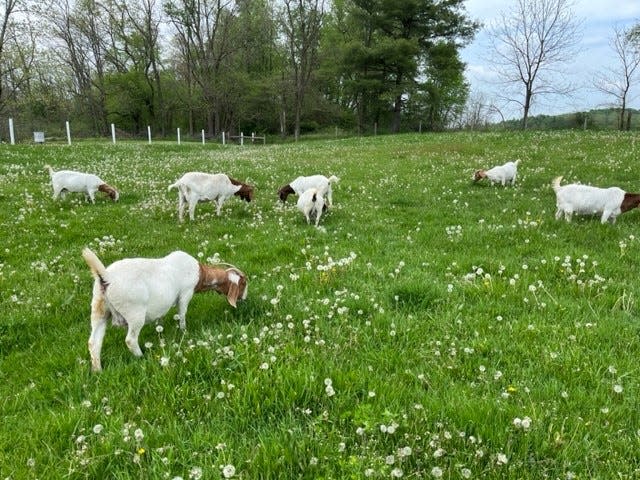Raising goats? Here's what you need to know about copper deficiency and its treatments
Knowing when a goat is copper deficient is very important when raising goats.
There are two types of copper deficiency, primary and secondary. Primary copper deficiency means the goats are not physically consuming enough copper. Goats can absorb copper from the grass and hay they eat but when the soil has low levels of copper their bodies are not able to absorb the copper. Goats can also absorb copper from grain and minerals that are fed to them. The exact amount of copper that is needed for goats is still unknown, but goats show us multiple signs when they don’t consume enough copper in their diet. They will have a faded or dull coat, balding, fish tail (balding tail tip), hair loss on the face and around the eyes.
More: USDA reports shrinking inventories. Are you charging enough for your hay?
Some goats will start to change color: a black goat will turn into a rusty color, red goats turn gold, gold goats turn cream and cream goats turn white. Copper-deficient goats can have fertility problems. Bucks might not be able to get does to settle (get them pregnant) and a doe might not come into heat, or she might have silent heats. A doe could get pregnant, then abort after a few weeks, or she could give birth to kids too premature to survive.

Goats are very susceptible to parasites. When a goat is deficient in copper, they have a hard time dealing with internal parasites. For example, they could start going downhill quicker than a goat that is not dealing with a copper deficiency.
Secondary copper deficiency means the goats could be consuming enough copper, but they are consuming minerals such as sulfur, iron, molybdenum and calcium that are copper antagonists. These minerals bind to the copper so it is not absorbed by the goat.
To determine how much copper is available to your goats you can get a soil test done and get your forage tested. Rock River Laboratory located in Wooster offers soil and forage testing. The Wayne County Extension Office does not have the tools to do these tests.
If you believe your goats need copper supplements, always consult with your veterinarian before treatment. Just as a reminder, effective in June all medically important antimicrobials for food-producing animals and pets will move from over-the-counter to prescription. This change affects any product that contains the following:
Oxytetracycline
Penicillin
Sulfa-based antibiotics (sulfadimethoxine and sulfamethazine)
Tylosin
Cephapirin and cephapirin benzathine
Swine medications lincomycin and gentamicin
CFAES provides research and related educational programs to clientele on a nondiscriminatory basis. For information, visit cfaesdiversity.osu.edu.
This article originally appeared on The Daily Record: Preventing copper deficiencies important when caring for goats

